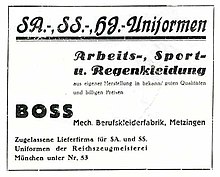Hugo Boss
Hugo Boss also sells licensed brand products for children's fashion, eyewear, watches, home textiles, riding apparel, writing utensils and fragrances.
In the early 1930s, Hugo Boss began to produce and supply military uniforms for the Nazi Germany government, resulting in a large boost in sales.
[7] After World War II and the founder's death in 1948, Hugo Boss started to turn its focus to men's suits.
In connection with the global economic crisis following the New York stock market crash of 1929, the company had to reduce its workforce by almost a quarter and file for bankruptcy in 1931.
[13][14] 1924 is also the year the company became a Reichszeugmeisterei-licensed supplier of uniforms to the Sturmabteilung (SA), Schutzstaffel (SS), Wehrmacht, Hitler Youth, National Socialist Motor Corps, and other party organizations.
[16] During the Second World War, besides its 300 employees, Hugo Boss employed 140 forced laborers, the majority of them women from the Soviet Union and Poland.
[11][20] In a 1946 judgment, he was stripped of his voting rights, his capacity to run a business, and fined "a very heavy penalty" of 100,000 ℛ︁ℳ︁ ($70,553 U.S.) (£54,008 stg), which was later decreased to 25,000 ℛ︁ℳ︁.
[11][20] However, Hugo Ferdinand Boss appealed, and he was eventually classified as a "follower", a lesser category, which meant that he was not regarded as an active promoter of National Socialism.
[20] In June 2000, Hugo Boss joined the Foundation Initiative of German Business for the Compensation of Forced Laborers and contributed financially to the fund.
[7][13] In the same year, the company issued a statement of "profound regret to those who suffered harm or hardship at the factory run by Hugo Boss under National Socialist rule".
[24][25] In 1970, the first Boss branded suits were produced and in 1972, the Holy brothers opened the first factory outlet in a nearby warehouse, which later became the Outletcity Metzingen.
[50] Under his leadership, Hugo Boss was transformed into a lifestyle group, the women's line was repositioned, and international expansion was driven forward, particularly in the Asian markets.
[52] In 2007, Valentino was acquired by financial investor Permira for €3.5 billion, which subsequently exerted a significant influence on the Hugo Boss company.
Furthermore, the company's own global prices were adjusted, while unprofitable stores were closed, existing ones modernized and the e-commerce business was expanded.
[76] In order to meet increased demands, the Group invested 100 million euros in a new distribution building at the Bonlanden-Filderstadt site near Stuttgart in the same year.
[108] As at March 2024, the shareholder structure was as follows:[109] As early as the 1980s, Hugo Boss began with product placements and the outfitting of celebrities.
[110] Hugo Boss dressed the leading actors Don Johnson and Philip Michael Thomas in the crime series Miami Vice.
[117] In addition, the Group established the Hugo Boss Foundation, whose main source of income is the "Every purchase counts" initiative.
The donations are intended to support local, regional and global impact-oriented projects, particularly in the fields of climate and environmental protection.
[119] In 2016, Hugo Boss became a member of the ZDHC Foundation (Zero Discharge of Hazardous Chemicals), which is committed to avoiding harmful substances in production.
[121] Furthermore, Hugo Boss was part of the Sustainability 2030 science platform initiated by the German government[122] and joined the Klimabündnis Baden-Württemberg in 2024.
Heiq Aeoniq LLC primarily sources its materials from discarded algae, sugarcane, straw, hemp, nutshells, cigarette butts, and coffee grounds.
After receiving an award on stage, Brand proceeded to talk about Hugo Boss's Nazi connection and did a goose step.
In September 2015, Hugo Boss (UK) was fined £1.2 million in relation to the death in June 2013 of a child who died four days after suffering fatal head injuries at its store in Bicester, Oxfordshire.
Oxford Crown Court had earlier been told that it had "negligently been left free-standing without any fixings"[134] and the coroner had said that the death was an "accident waiting to happen".
Since the day of the accident Hugo Boss has done all it can, first to acknowledge those failings, to express genuine, heartfelt remorse and also demonstrate a determination to put things right and ensure there cannot be a repeat of what went wrong.
[139] In 2020, Hugo Boss told NBC News it did not use cotton from the Xinjiang area of China to avoid Uyghur forced labor.
"[143] Initially attracting thousands of likes, the edited Weibo post received many comments accusing the brand of hypocrisy.
[143] In September 2021, the European Center for Constitutional and Human Rights filed a complaint with German prosecutors accusing Hugo Boss of abetting and profiting from forced labor in Xinjiang.
[29][154] This led to several drivers being outfitted with Hugo Boss clothing, including Alain Prost, Ayrton Senna, and Niki Lauda.



